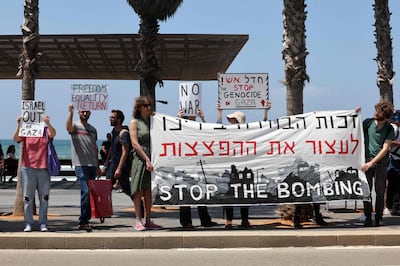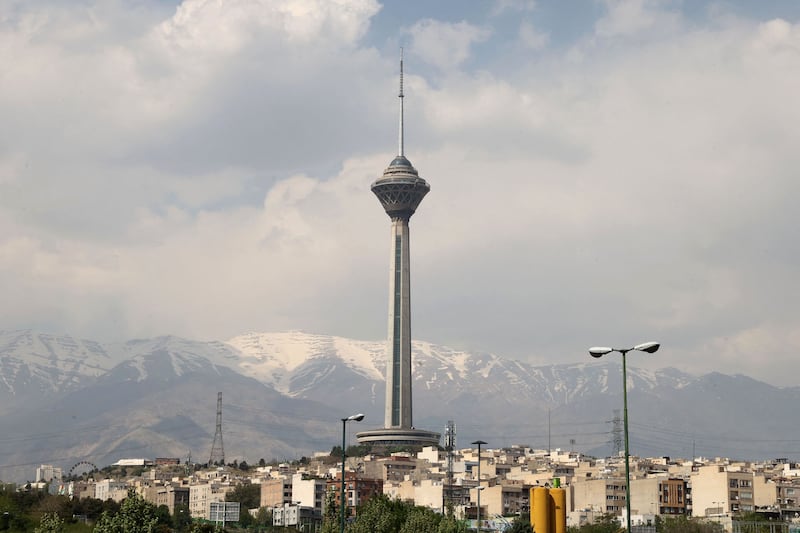Live updates: Follow the latest on Israel-Gaza
Israel’s reported attack on a military base in Isfahan will probably be tolerated by Iran and is unlikely to provoke further direct retaliation, sources close to Tehran and experts told The National on Friday.
Tehran has played down the incident and Israel refrained from officially acknowledging it, suggesting both parties have chosen to return the conflict to the shadows.
“If the scenario of the Israeli response remains the same, then it means that the US administration has succeeded in containing the dangerous open confrontation,” a source close to Iran-backed militant groups in the Middle East said.
“Although the Israeli leaks are limited, they may indicate that the Israeli government has committed, at least until now, to the principle of the limited attack, which seems tolerable and won’t trigger a new round of confrontation.”
The military strike on Iranian territory came less than a week after Tehran's unprecedented rocket and drone barrage against Israel.
Two Israeli and three Iranian officials confirmed Friday's strike, The New York Times reported, while CNN reported a “senior US official” said Israel was behind the attack but the US played no role.
Iran's state news agency Irna quoted a military official in the central Iranian city of Isfahan, Brig Gen Mihan Dost, as saying loud noises heard east of the city were air defence systems intercepting what he called “suspicious targets” and that no damage was reported in the area.
The Fars news agency said “three explosions” were heard in the area of the Shekari military airbase near Isfahan, south of the capital Tehran and not far from Iran's largest nuclear research complex.
Iran attacked Israel last Saturday in retaliation for the Israeli strike on the Iranian consulate in Damascus on April 1. It was Tehran's first direct known attack against its regional foe and marked the start of a new chapter in confrontation between the two countries.
Israeli and allied air defence systems intercepted the vast majority of the drones and missiles fired last week. It caused minor damage in Israel, although a girl was reportedly wounded by shrapnel.
Nevertheless, Israel’s war cabinet, led by Prime Minister Benjamin Netanyahu, opted for retaliation that was intended to be “painful” to Iran, without sparking a full-blown war, according to Israeli media. An Iranian official then warned Tehran would retaliate “within seconds” against any Israeli attack.
“The region entered a new turning point since the attack on the Iranian embassy building in Damascus, but Israel’s focus is on Gaza and south of Lebanon,” said another source close to Iran’s backed militias. "They know it’s not the right timing for a direct war with Iran."

Sources close to Tehran this week told The National Iran was already gearing up to counter an Israeli retaliation, possibly within its borders, after Israel said it had decided to respond to last Saturday's barrage.
Iran's military and political leaders have determined a specific level of Israeli response that could be tolerable, even if on Iranian soil, without provoking severe retaliation from Tehran, the sources added.
The Isfahan attack was “an Israeli attempt to restore deterrence, but it's a weak and failed attack", said Kassem Kassir, a political analyst with insights into Iran-backed Hezbollah. "The Iranians are studying the situation to determine their stance.”
Israeli far-right National Security Minister Itamar Ben-Gvir posted one word on X – “lame” – after reports of the Israeli attack emerged.
Before the strike, debate was raging in Israel about how to respond to the unprecedented direct Iranian assault, with some ministers said to be furious that Mr Netanyahu had delayed retaliation.
Reports that a majority of ministers in Israel's government prefer strong retaliation have placed Mr Netanyahu on a collision course with crucial international allies, who launched a frantic effort this week to dissuade Israel from a large-scale attack on Iran, fearing it could lead to a regional war.
Political analyst Joseph Daher told The National Israel appears to have abided by limits imposed by the US to avoid further escalation.
US President Joe Biden, who is running for re-election in November, has been trying to prevent Israel's war in Gaza, which broke out on October 7, from spreading across the region.
"These attacks show a desire to prevent escalation into a regional conflict and to maintain a low level of intensity, which was maybe forced upon Israel by US pressure," Mr Daher said. "Each side displayed strength while preserving deterrence."





